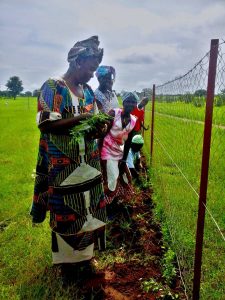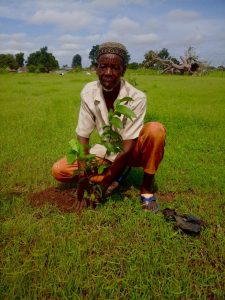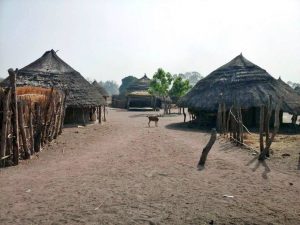This project is made possible through the partnership of WATER CHARITY and the NATIONAL PEACE CORPS ASSOCIATION. ![]()
Location
This project summary has been redacted for security reasons to omit the specific project location.
Department of Velingara, Kolda Region, Senegal
 Community Description
Community Description
The project will be implemented in a rural village of 450 people, located in the eastern part of the Kolda region. It is 5 km from the paved road, 30 km from a major city, and there is no running water or electricity.
All families are subsistence farmers, with peanuts, sorghum, and corn as the primary crops. Due to the village’s remote location and resource constraints, economic activities are limited to cotton and charcoal production.
Ethnically, the village is Pulaar, with two main sub-groups: Fulakunda and Pula Futa. The Pulaar ethnic groups are traditionally pastoralists, and their living situations continue to reflect these traditional nomadic values. Villagers live in short-lived domed mud-brick houses with straw roofs, women cook with fuelwood collected from the forest, and livestock roams the village. There are 20 family compounds, with approximately 20-25 people living in each compound. Men and older women are usually found working in the woods or fields, and younger women take care of the children, cooking, and cleaning.
The population is very young; almost 50% of the population is under the age of 18. There is a primary school in the village, and the middle school is located in a roadside village 5 km away. Though middle school is relatively close, many families do not have the expendable income necessary to pay for school fees and supplies.
Indeed, this village is located in the poorest region of the country, with the majority of the population living below the poverty line of $1.90 per day according to the World Bank. Because of this and the community’s remote location, many villagers suffer from malnutrition. This, in turn, affects the well being of the entire family as each member of the family shares responsibilities of the fields and/or the home. There is a strong workforce of motivated women eager to capitalize on income-generating activities and provide adequate nutrition for their families.
Problem Addressed
The primary barrier to adequate nutrition in this village is access to fresh fruits and vegetables. The diet is severely lacking in proteins and essential nutrients, comprised primarily of carbohydrates from grains such as sorghum, corn, or white rice. Due to very large family sizes and little income, members of the community do not have the expendable income necessary to buy healthy food. In addition, the nearest market is 10 km away, and without electricity, there is no preservation method to store fresh produce. As such, when possible, women construct personal vegetable gardens. This is easy during rainy season while livestock are tied up and water is abundant, and each household maintains its own vegetable garden. However, during the remaining eight months of the dry season, water limitation and lack of a collective garden space prevent the production of fresh vegetables. As such, the majority of the year, vegetables are severely lacking from the diet and community nutrition is very poor.
 Project Description
Project Description
This project is to create a protected one-hectare gardening space with water access. A center well will be built with three feeder basins.
The women are well versed in gardening practices, and ultimately want to create a long-lasting garden that the entire gardening cooperative can utilize year-round.
The village men worked with a contractor to install a chain-link fence to enclose the gardening space and protect it from livestock. The women created a tree nursery and planted thorny tree species around the perimeter to begin the establishment of a live fence to ensure sustainable protection. Fruit trees (guava and mango) were also planted within the garden to increase the village’s fruit production.
A well contractor from a nearby city has visited the site and agreed to build the well and accompanying basins. A thirty-meter, cement-lined well will be constructed in the center of the garden space, structurally reinforced with rebar for use with pulley systems.
Three 80 cm x 80 cm feeder basins will be built adjacent to the well and water poured into these basins will be gravity fed twenty meters through underground piping to the accompanying 2 m x 2 m storage basins.
The Peace Corps Volunteer will hold primary responsibility for purchasing materials, and the village men will be responsible for the transportation of the materials from the city to the village.
The contractor has a team of three well diggers and one mason that will live in the village and workdays until the well and accompanying basins are complete. The village will provide room and board for the workers.
Since there is no water available at the worksite, the women will pull and transport water to the work site each morning. Construction is expected to be finished in time for the women to begin dry season gardening.
Upon completion of this project, the women’s group of Sare Meta will have a long-lasting garden space equipped with all the necessary resources to produce vegetables year-round. Additionally, due to the large garden size, women have the opportunity to grow vegetables in excess and sell them to surrounding villages, thus supplementing the family income.
 Further, the Peace Corps Volunteer will conduct a series of training to promote fruit tree propagation, grafting, and orchard management. The success of this project will result in the establishment of a community orchard, income-generating opportunities for women, and increased community nutrition.
Further, the Peace Corps Volunteer will conduct a series of training to promote fruit tree propagation, grafting, and orchard management. The success of this project will result in the establishment of a community orchard, income-generating opportunities for women, and increased community nutrition.
The Women’s Group will be responsible for the cash and in-kind contribution for the project, 25% of the project cost
Project Impact
84 women will directly benefit, and the remaining 366 older women, men, and children will indirectly benefit.
Peace Corps Volunteer Directing Project
Jenna Dodson
Monitoring and Maintenance
The Peace Corps Volunteer will be responsible for the following:
-Purchasing construction materials, creating an inventory list, and monitoring material use
-Supervising/monitoring construction of well and accompanying basins
-Overseeing tree nursery construction, maintenance, and planting
-Conducting an orchard management training
The community (men and women’s group) will be responsible for the following:
-Paying the cash contribution
-Transportation of materials to the worksite
-Ensuring proper room and board for the on-site construction workers
-Construction, maintenance and planting of 1,000-tree nursery to complete the live fence
-Maintaining the garden after construction, including tree pruning and fence repair
The well contractor and his team will be responsible for the following:
-Purchasing construction materials
-Digging and reinforcing the well with cement
-Masonry for the feeder basins and wellhead
-Implementation of the underground pipe system
Let Girls Learn
Although not designated as an official Let Girls Learn project, this project will indirectly benefit young girls in three ways. First, they will have improved nutrition due to the increased consumption of essential vitamins and minerals. This will decrease their susceptibility to disease, thus reducing the likelihood of school absences due to illness. Second, there is potential for income generation when women sell excess produce. These funds may be used to offset the cost of their children’s education. Lastly, women involved in business transactions will act as role models for young girls eager to continue their education in order to find better work opportunities.
Fundraising Target
$1,500
Funds raised in excess of the project amount will be allocated to other projects in the country.
Donations Collected to Date
$100
ADOPT THIS PROJECT BY CONTRIBUTING THE DOLLAR AMOUNT OF THE PROJECT
Donations of any amount will be appreciated. The full amount will give you “naming rights”, if that is something you would like.
Dollar Amount Needed
$ 1,400 ![]()